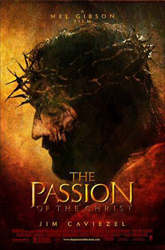 Director:
Mel Gibson
Starring:
James Caviezel
Monica Bellucci
Maia Morgenstern
Hristo Naumov Shopov
Pietro Sarubbi
Luca Lionello
Rosalinda Celentano
Release: 25 Feb. 04
IMDb
|
The Passion of the Christ 
BY: DAVID PERRY
Mel Gibson is mad. His anger, though, isnít over L.A. crime,
or depleted oil reserves, or government conspiracies, or British
colonialism, or child abductors, or a deformed face, or even rottenness in
Denmark. Gibson is mad because Jesus suffered on the cross and the Jews are
partly responsible. Worse yet, there are blasphemous philistines who are now
willing to question the theological and artistic merits of his film The
Passion of the Christ. Gibson seems to be saying that only the morally weak
or the historically guilty are faulting his filmmaking. Heís suffering for
his art.
The Passion of the Christ is a snuff film with biblical touches. Although
Iím willing to accept the flagellation some readers may want to aim upon me
for my take on this film -- Gibson has already ingeniously used the media,
especially the Christian and conservative media, to disregard the critics --
The Passion of the Christ isnít even a complete realization of what brings
people faith in the story of Jesus. Iím not a religious person, but Iíll be
the first to say that this film is cold and devoid of any of the attentive
philosophy that makes Jesus, messiah or not, such an important figure.
Martin Scorsese didnít play with the Christians when he made The Last
Temptation of Christ, which is why the film was picketed upon its release.
But, politicking aside, the artistic difference between these two films is amazing. Both helmed by
devoted Catholics, each has his own way to deal with the meaning of the
death of Jesus. Where Scorsese searched for perspective and understanding in
the final moments, Gibson is willing to abandon all context in lieu
of abrasive agitprop sadomasochistic martyrdom. The Jesus of The Passion
isnít so much a man who had something to say, but a man who just suffered
greatly. And, no, inserting a scene during the Last Supper that lasts barely
a minute is not enough to gain your Jesusí teaching requirements.
Perhaps Iím not the right person for this film anyway, but Iím not really
certain who is, except for those who will elevate its import because they
feel their beliefs are under attack by the filmís critics. This is a bloody,
listless, and wholly unappealing work that seems to gesture to the audience
as a way to make them feel bad. People cry at screenings of this film
because theyíve been provoked into numbness. The meaning of Jesusí death
isnít the Christian salvation of the human race, but merely a chance for
another Mel Gibson character to be deified in his own blood.
Iíve heard some call this the Catholic Church's reading of the Gospels, which
emphasizes the agony to make the power of the action more reverberant. I
donít know how much credence this has, but I cannot fully understand what could
be gained by putting such a viewpoint on film. Those who are already devoted
are going to feel affirmation in their guilt and pain; those who havenít
been converted likely wonít be by the filmís end. This is The Triumph of the
Will for Jesus freaks, but devoid of any attention to what makes propaganda
work as a unifier, not as a divider. By the time a ridiculously cartoonish
personification of Satan (part Joan Allen, part Ziggy Stardust), walks into
the frame with a deformed midget in her arms, the whole work reaches levels
of humorous absurdity that couldnít be more refreshing among long,
slow-motion scenes of a man beaten into a bloody pulp and nailed to a cross.
My faith in Lynchian farce has been strengthened by watching Melís Crusade.
 |

